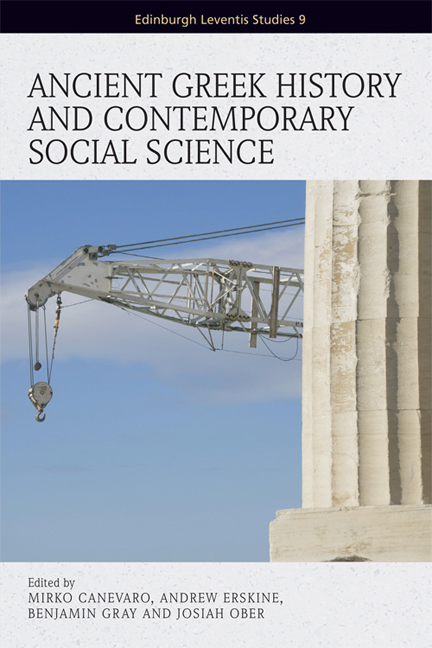Introduction
Published online by Cambridge University Press: 06 May 2021
Summary
The history of the relationship between the disciplines constituting social science and those constituting classical studies is long and the relationship has sometimes been contentious. Indeed, it is possible to see the two fields as sharing a common origin in the work of Greek writers of the fifth and fourth centuries bce. And we might also see certain enduring features of each field as having their origins in debates, among those same writers, concerning the best way to study the Greek past (Ober 2006; Ober and Perry 2014 on Thucydides). But, whether in spite of or because of sharp disagreements over methods and ends, ancient Greek history and culture have been touchstones for some of the most important social theorists of modernity. Karl Marx, Max Weber, Emile Durkheim, Sigmund Freud, Claude Lévi-Strauss and Hannah Arendt are only a few of the standouts in a much larger group of mid-nineteenth- to mid-twentieth-century social theorists who drew inspiration from their deep knowledge of classical history and culture. It is equally clear that the social sciences of anthropology, economics, political science, psychology and sociology have long been sources of productive approaches by which classicists have sought to gain a better understanding of ancient Greece.
By applying methods drawn from anthropology, sociology and psychology to the history and cultural products of antiquity, twentieth- century social scientists and classicists alike contributed in fundamental ways to our grasp of the society of classical Greece, and of its legacy. Examples of influential schools of scholarship from the mid- to later-twentieth century include the pioneering work by the Paris school based in the Centre Louis Gernet. This school was led by, among others, Jean-Pierre Vernant and Pierre Vidal-Naquet; much of its work was grounded in the structuralism of Lévi-Strauss. A roughly contemporary Cambridge school centred on the charismatic personality of Moses I. Finley and the Weberian sociological approach to history that he advocated. A more diverse but influential Princeton school that had close connections with both Paris and Cambridge owed much to W. Robert Connor's deep involvement with the cultural anthropology of Clifford Geertz (then at the Institute for Advanced Study). Meanwhile, Marx and Engels’ economic and political theory underpinned the work of an international assortment of historians of Greek antiquity, famously including, in Oxford, Geoffrey de Ste Croix.
- Type
- Chapter
- Information
- Publisher: Edinburgh University PressPrint publication year: 2018



